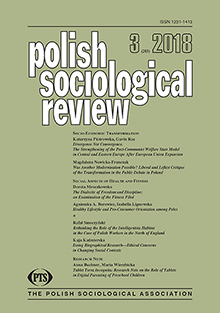Divergence Not Convergence. The Strengthening of the post-Communist Welfare State Model in Central and Eastern Europe After European Union Expansion
Divergence Not Convergence. The Strengthening of the post-Communist Welfare State Model in Central and Eastern Europe After European Union Expansion
Author(s): Katarzyna Piotrowska, Gavin RaeSubject(s): Sociology
Published by: Polskie Towarzystwo Socjologiczne
Keywords: Welfare state; Esping-Andersen; European Union; Central and Eastern Europe; Cluster analysis; post- Communism
Summary/Abstract: This paper analyses the welfare states in the post-Communist countries from Central and Eastern Europe, which are members of the European Union. It applies the welfare regime typology methodology, partly developed by Esping-Andersen, as a framework for this research. The paper examines the two main predictions that emerged from the literature on the future of the welfare states in Central and Eastern Europe. Firstly, was the thesis that these welfare states would not fit easily into any of the existent models in Western Europe. Secondly, that these welfare states would gradually converge with one or more of the welfare regimes existent in the West. We have used hierarchical cluster analysis to check the extent of this welfare convergence/divergence over the first ten year period after the eastern expansion of the European Union (2004 and 2014). We discovered that in 2004 the postcommunist countries were divided between two clusters, although by 2014 all of the post-Communist countries (apart from Slovenia) had grouped together in one separate cluster. Therefore a process of divergence from the western European welfare models and a convergence between the post-Communist welfare states had actually occurred.
Journal: Polish Sociological Review
- Issue Year: 203/2018
- Issue No: 3
- Page Range: 303-320
- Page Count: 18
- Language: English

